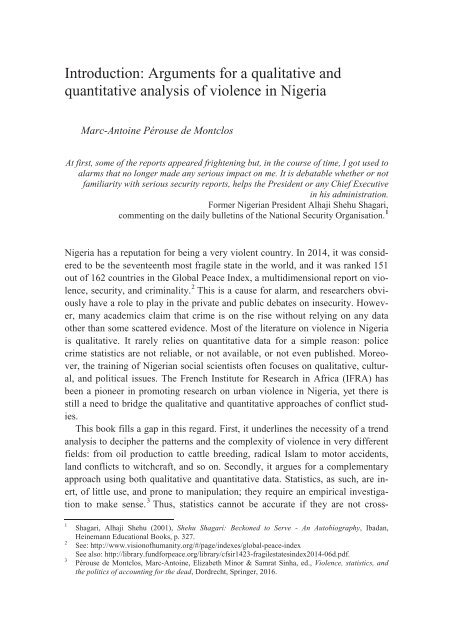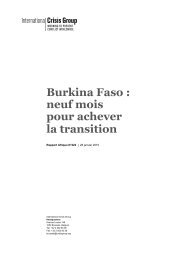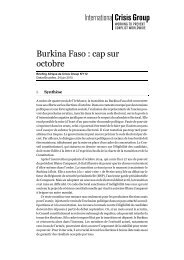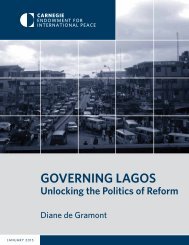Violence in Nigeria
ASC-075287668-3743-01
ASC-075287668-3743-01
Create successful ePaper yourself
Turn your PDF publications into a flip-book with our unique Google optimized e-Paper software.
Introduction: Arguments for a qualitative and<br />
quantitative analysis of violence <strong>in</strong> <strong>Nigeria</strong><br />
Marc-Anto<strong>in</strong>e Pérouse de Montclos<br />
At first, some of the reports appeared frighten<strong>in</strong>g but, <strong>in</strong> the course of time, I got used to<br />
alarms that no longer made any serious impact on me. It is debatable whether or not<br />
familiarity with serious security reports, helps the President or any Chief Executive<br />
<strong>in</strong> his adm<strong>in</strong>istration.<br />
Former <strong>Nigeria</strong>n President Alhaji Shehu Shagari,<br />
comment<strong>in</strong>g on the daily bullet<strong>in</strong>s of the National Security Organisation. 1<br />
<strong>Nigeria</strong> has a reputation for be<strong>in</strong>g a very violent country. In 2014, it was considered<br />
to be the seventeenth most fragile state <strong>in</strong> the world, and it was ranked 151<br />
out of 162 countries <strong>in</strong> the Global Peace Index, a multidimensional report on violence,<br />
security, and crim<strong>in</strong>ality. 2 This is a cause for alarm, and researchers obviously<br />
have a role to play <strong>in</strong> the private and public debates on <strong>in</strong>security. However,<br />
many academics claim that crime is on the rise without rely<strong>in</strong>g on any data<br />
other than some scattered evidence. Most of the literature on violence <strong>in</strong> <strong>Nigeria</strong><br />
is qualitative. It rarely relies on quantitative data for a simple reason: police<br />
crime statistics are not reliable, or not available, or not even published. Moreover,<br />
the tra<strong>in</strong><strong>in</strong>g of <strong>Nigeria</strong>n social scientists often focuses on qualitative, cultural,<br />
and political issues. The French Institute for Research <strong>in</strong> Africa (IFRA) has<br />
been a pioneer <strong>in</strong> promot<strong>in</strong>g research on urban violence <strong>in</strong> <strong>Nigeria</strong>, yet there is<br />
still a need to bridge the qualitative and quantitative approaches of conflict studies.<br />
This book fills a gap <strong>in</strong> this regard. First, it underl<strong>in</strong>es the necessity of a trend<br />
analysis to decipher the patterns and the complexity of violence <strong>in</strong> very different<br />
fields: from oil production to cattle breed<strong>in</strong>g, radical Islam to motor accidents,<br />
land conflicts to witchcraft, and so on. Secondly, it argues for a complementary<br />
approach us<strong>in</strong>g both qualitative and quantitative data. Statistics, as such, are <strong>in</strong>ert,<br />
of little use, and prone to manipulation; they require an empirical <strong>in</strong>vestigation<br />
to make sense. 3 Thus, statistics cannot be accurate if they are not cross-<br />
1<br />
2<br />
3<br />
Shagari, Alhaji Shehu (2001), Shehu Shagari: Beckoned to Serve - An Autobiography, Ibadan,<br />
He<strong>in</strong>emann Educational Books, p. 327.<br />
See: http://www.visionofhumanity.org/#/page/<strong>in</strong>dexes/global-peace-<strong>in</strong>dex<br />
See also: http://library.fundforpeace.org/library/cfsir1423-fragilestates<strong>in</strong>dex2014-06d.pdf.<br />
Pérouse de Montclos, Marc-Anto<strong>in</strong>e, Elizabeth M<strong>in</strong>or & Samrat S<strong>in</strong>ha, ed., <strong>Violence</strong>, statistics, and<br />
the politics of account<strong>in</strong>g for the dead, Dordrecht, Spr<strong>in</strong>ger, 2016.






